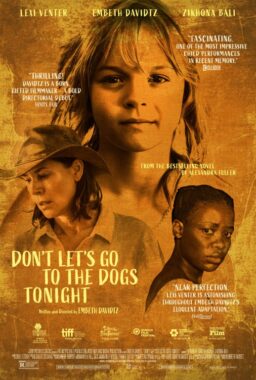In my four years of Sundancing, the Next program has become
one of my favorite sections of the annual Park City affair, as it highlights
new voices in cinema, often presenting viewers with unique takes that they won’t
find in other programs. “The Eyes of My Mother,” which kicked off the program
this year, already counts as a stand-out, but other Next films have been
premiering all weekend, including a trio of offerings that couldn’t be more
diverse in terms of storytelling, style and intent. Sadly, two out of three of
them miss their mark wide enough to be considered disappointments, but one is a
stand-out for the charismatic, engaging performances at its core.
Let’s start at the top. Kerem Sanga’s “First Girl I Loved” is a tender, sweet story of teenage romance with
two fantastic acting turns to anchor it. The rest of the piece sometimes gets
away from its writer/director but when it focuses on its pair of committed
actresses, it’s believable, confident and even moving. Anne (Dylan Gelula from “Unbreakable
Kimmy Schmidt”) is a 17-year-old girl who could be called a nerd. She’s more
likely to take photographs of the sports team than be on it. And one day when
she’s doing just that, she spots a beautiful girl named Sasha (Brianna
Hildebrand) and falls instantly in love. She’s not entirely able to express her
passion, especially to her best friend Cliff (Mateo Arias), who complicates things
even further by revealing that he’s trying to get out of the friend zone with
Anne himself. One of the most refreshing things about “First Girl I Loved” is
that Anne’s sexuality isn’t treated as a manipulative, after-school special
device. It’s just a part of who she is that she’s discovering through her
relationship with someone who may be discovering the same thing.
Gelula and Hildebrand make so many great, genuine choices. I
love that Sasha is kind of awkward and dorky too—not a perfect object of
interest that she could have been. Sanga puts neither of these characters on a
movie pedestal, allowing the two actresses to embody them in a way that feels
real. I wish more of that happened in the rest of the film. Cliff, the mothers
of the two girls, their teachers, etc. all feel false to such a degree that I
started to wonder if it wasn’t intentional—as if these two young ladies were
the only genuine people left in the world. In some ways, that’s what young love is like. The rest of the world falls away.

While the two protagonists of “First Girl I Loved” make up
for the film’s problems enough to merit a cautious recommendation, the flaws of
the other two Next movies I’ve seen so far push the needle just far enough in
the other direction. J.D. Dillard’s “Sleight” has an interesting concept
and engaging protagonist but the execution is flat, especially in a final act
that doesn’t have nearly the energy of the closing scenes of a film that could
accurately be called “”Dope” meets “The Prestige””.
Bo (Jacob Latimore) is a charismatic young street magician,
the kind of guy who gets the tourists gasping on street corners with his
sleight of hand. He’s also struggling as he’s the sole caretaker for his little
sister, and so he deals a few drugs on the side for a local tough guy named
Angelo (a miscast Dule Hill). It’s no big deal—just some Molly to guys on the
weekend who want to party. The problem is that Bo is a good employee, and so
when Angelo feels threatened by another drug dealer who’s moved to town, he draws
the magician into his inner circle, complete with higher stakes and increased violence.
At the same time, Bo falls for a beautiful young lady named Holly (Seychelle
Gabriel). As his jobs for Angelo get more intense, he realizes that he’ll have
to use some magic to get Holly and his sister to safety.
It’s a good idea for a movie—a young man using a unique set
of tools to escape a dangerous situation. The problem is the danger, or lack
thereof, in “Sleight.” The stakes never feel high enough, and so when the piece
does get violent, it feels unearned. Too many of Bo’s decisions feel overly
scripted, especially in the final act, and the overall film needed to take more
risks to stand out from the crowd as much as it could have. A movie about a
street magician caught up in the drug trade needs to be violent, edgy and scary—and
“Sleight” is none of these things. Unlike Bo, it blends into the crowd.

Whatever one may say about the near-miss antics of “Operation Avalanche,” it definitely doesn’t
blend into the crowd. It’s the kind of thing I love to see in Next—a film by
a talented writer/director who’s actually graduating from the little festival
just up the hill, Slamdance, where his “The Dirties” won the top prize in 2013
(and played the first Chicago Critics Film Festival). Writer/director/star Matt
Johnson has actually delivered a film structurally similar to “The Dirties”
although with the greater scope that often comes with success. Sadly, “Operation
Avalanche” is more interesting concept than execution, a film that needed
another pass in the writing process and to lose 10-15 minutes in the final
product.
On paper, “Operation Avalanche” approaches brilliance from
its logline—a mockumentary about the guys who faked the moon landing. It’s 1967
and the FBI has recruited a pair of young, eager cadets who start the film
placed on Operation Deep Red, an investigation into whether or not Stanley
Kubrick is a spy, and then move to Operation Zipper, which is designed to find
a suspected Soviet mole within NASA. While on that operation, Matt (the character
and real film creator share the same name) overhears a life-changing
conversation—NASA will not be able to send a man to the moon anytime soon. They
will not fulfill Kennedy’s prophecy, lose the space race to Russia, and all
hope will be lost. Matt has a brilliant idea—why not fake the moon landing? As
Matt points out, “Walter Cronkite will do half the work for us.”
Johnson is clearly having a blast with “Operation Avalanche”
and that energy is effective … for a while. The sometimes-nauseating shaky cam
structure wears out its welcome by the hour mark and Johnson drags the ending
out past the breaking point. He never quite figures out how to add the right
tension to the final act, as the stakes don’t feel high enough early enough for
us to care. As the operation falls apart for Matt, so does the film, becoming
less interesting instead of more intense. Despite that, I’m still eager to see
what Johnson does next. Ditto Sanga and Dillard. And that’s what Next is really
all about.












